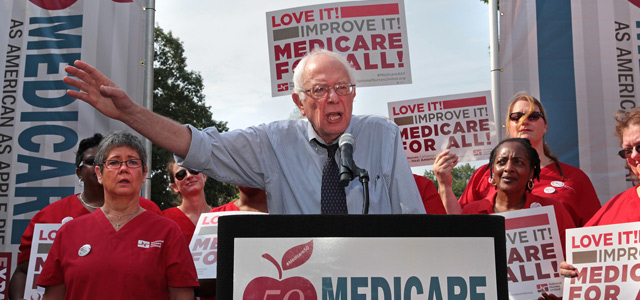 The following analysts can debunk various myths regarding the current healthcare debate:
The following analysts can debunk various myths regarding the current healthcare debate:
GERALD FRIEDMAN, gfriedma at econs.
Professor of economics at the University of Massachusetts at Amherst, Friedman’s work was the basis for attacks on Sanders in the Wall Street Journal, which the Clinton campaign seems to be drawing from. See in-depth accuracy.org news
JEAN ROSS, Contact: Charles Idelson, cidelson at nationalnursesunited.org
While Clinton claimed at the Democratic debate: “We finally have a path to universal health care,” referring to Obamacare, which penalizes people who don’t purchase private insurance, Ross, co-president of National Nurses United notes: “Today, 29 million people remain uninsured. Tens of millions more remain under insured, facing bankruptcy or the choice of getting the care they need or paying for food or housing for their families.”
NNU, the largest nurses union in U.S. history, has endorsed Sanders for president. In “Nurses Applaud New Sanders Plan for Healthcare for All,” they say “It is Bernie Sanders, who in contrast to the Clinton campaign, clearly understands that our profit-focused healthcare system continues to abandon millions of Americans to crushing medical debt, discrimination based on race, gender or ability to pay, and an inability to buy expensive insurance due to the still high cost.”
STEFFIE WOOLHANDLER, M.D., DAVID HIMMELSTEIN, M.D., himmelhandler at comcast.
While Clinton claimed at the Democratic debate: “I don’t want to see us start over again with a contentious debate,” Woolhander and Himmilstein met with Clinton while she led healthcare overhaul efforts in the 1990s. They urged a single-payer plan, and note that she understood it would be better for the country, but was uninterested in persuing it for political reasons. See The Intercept: “In 1993 Meeting, Hillary Clinton Acknowledged ‘Convincing Case’ for Single-Payer.” See The Washington Monthly in 1993: “Dead on arrival: why Washington’s power elites won’t consider single payer health reform“: How, Clinton asked Himmelstein, “do you defeat the multi-billion dollar insurance industry? ‘With presidential leadership and polls showing that 70 percent of Americans favor [the features of] a single-payer system,’ Himmelstein recalls telling Mrs. Clinton. The First Lady replied: ‘Tell me something interesting, David.'”
JEFF COHEN, jcohen at ithaca.edu
Clinton claimed that when she headed the healthcare overhaul efforts in the 1990s, “the revolution never came. (LAUGHTER) And I waited and I’ve got the scars to show for it.”
Director of the Park Center for Independent Media at Ithaca College, founder of media watch group FAIR and cofounder of the online activism organization RootsAction.org, Cohen co-wrote the piece “Clintons vs. Insurance Industry: A Media Myth” in 1993 that notes: “We can expect mainstream news outlets to paint a picture of Bill and Hillary Clinton in mortal battle against the big bad insurance industry. It’s a vivid picture, but it distorts reality. …
“A full-blown media myth was born, with most reports omitting basic facts:
“** The Health Insurance Association of America, which opposes the Clinton plan, … represents small to medium-size insurance companies. They would lose out to bigger firms under the administration’s ‘managed competition’ plan.
“** The ‘Big Five’ of health insurers-Aetna, Cigna, Metropolitan Life, Prudential and Travelers-have formed the Alliance for Managed Competition, which is sympathetic to the Clinton plan. That’s because those firms, heavily invested in Health Maintenance Organizations, would be enriched by it.
“** Operating through the Jackson Hole study group, the insurance giants helped draw up the managed competition blueprint, later adopted by the Clinton administration.”